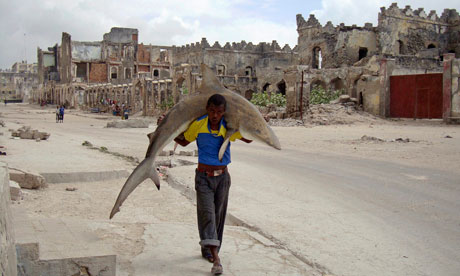
Omar Feisal, a Reuters photographer based in Somalia, won the Daily Life Single category at the 2011 World Press Photo awards with this picture of a man carrying a shark through the streets of Mogadishu, Somalia. Photograph: Feisal Omar/Reuters
Many make the most of minor subjects: Feisal Omar’s picture of a Somali carrying a man-size shark through a devastated Italian colonial street is the most extraordinary, otherworldly image in the book; Marco di Lauro’s image of a Nigerian meat market conjures Hieronymus Bosch. Daniel Berehulak’s images of the Pakistan floods, by contrast, are efficient documentary shots of a traumatic, “big” news subject, but lack the streak of visual experimentation or surreal commentary that would give them “artistic” punch. Some images, such as Javier Manzano’s Mexican murder victims, have absurdity and bleak beauty to spare, but only regional resonance. The form’s tilt in favour of experienced photographers and “artistic” work enables an escape from any suggestion that juries sit in judgment over suffering humanity. Yet it also validates the photojournalist’s cliche, that their skills “bring attention to” far-flung subjects. “Attention” is a very blunt instrument, more effective locally than from afar, where it produces mostly helpless perturbation.
Nevertheless, viewers can hardly object if the pictures of pain displayed in their shelters arrive dressed up for the marketplace of their sympathies; to the extent that they do, they may need to learn to be perturbed in finer, bolder ways.
http://www.guardian.co.uk/artanddesign/2011/may/29/world-press-photo-11-review
This description of ‘awareness’ as a ‘blunt instrument’ bears out the description in my thesis of the PlayPump’s ‘awareness-raising’ as limited, in that it doesn’t help to inform the viewer of the complexity of the water problem in the developing world, just of its own ability to solve it.